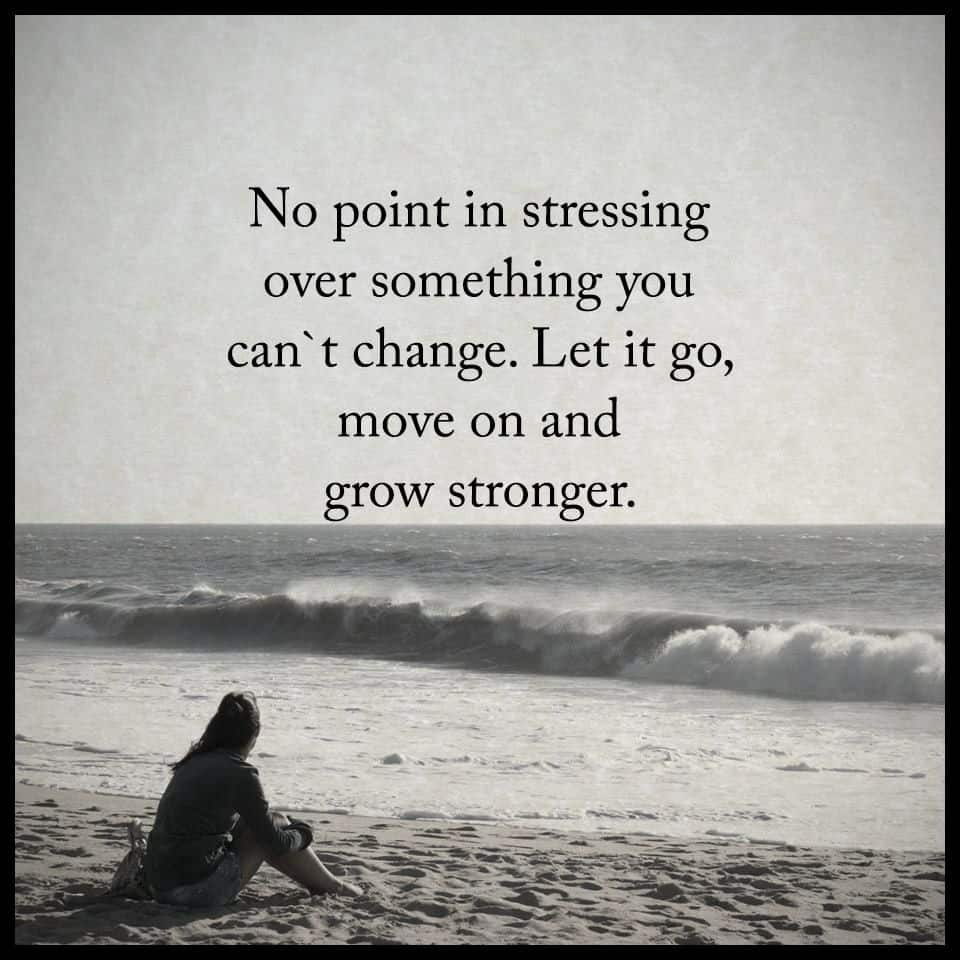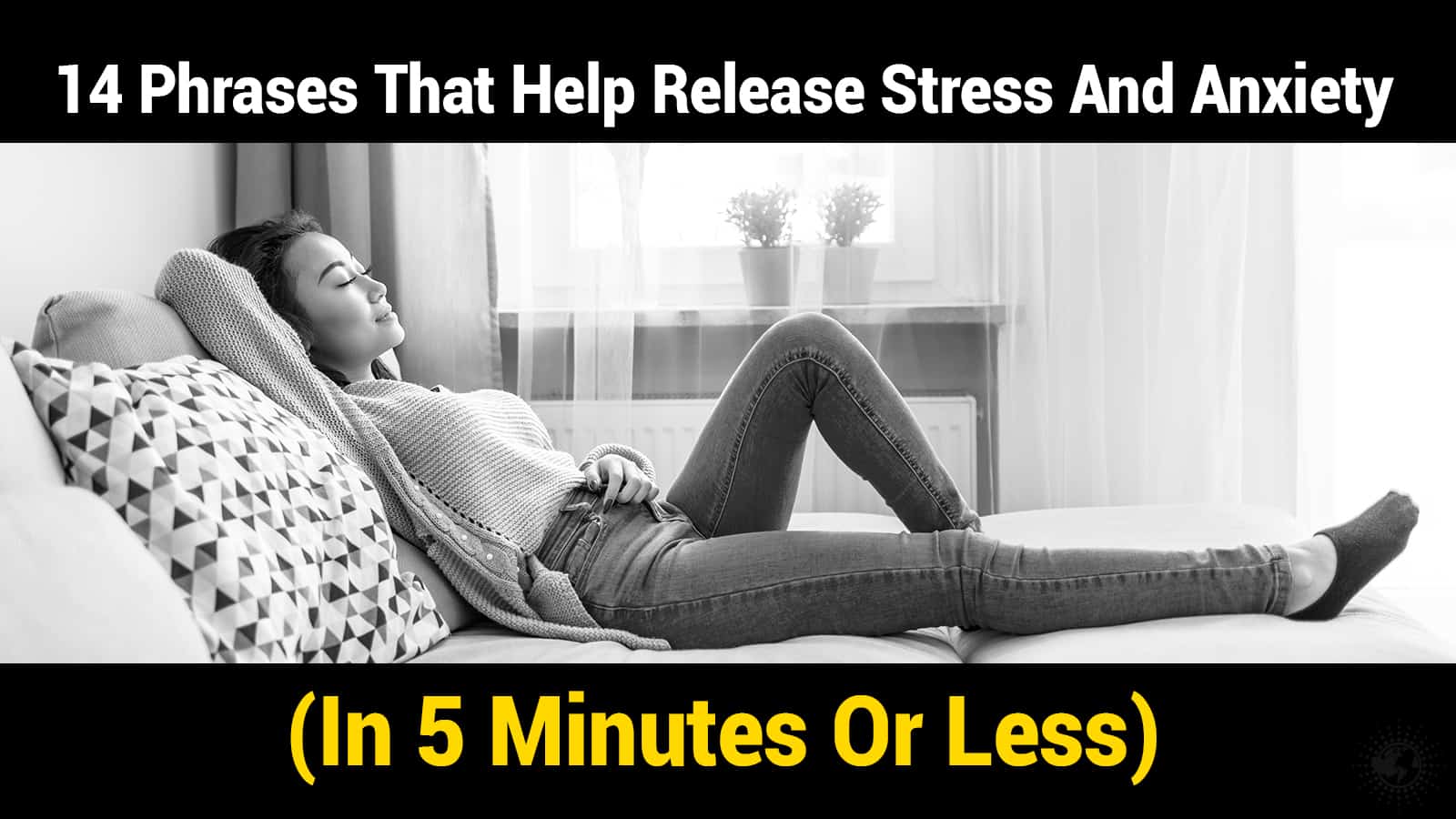Words can hold incredible power within them. They can forge and break bonds, comfort or hurt, and change perspectives. Besides that, they can help you release stress and anxiety.
Don’t wait for the familiar feeling of stressors to creep up on you. Read these techniques, as suggested by top therapists. You will be ready to deal with your triggers the next time you need to.
Release Stress and Anxiety with These 14 Powerful Phrases
You can say certain words to yourself and others that give you their power and transform situations in your favor. Here’s how experts recommend 14 powerful words to help you release stress and anxiety instantly.
1. “I Forgive You.”
 Are you currently holding onto any grudges? Letting go of them in the act of forgiveness can be a very positive, beautiful thing. The act of holding grudges has been found to increase stress, but forgiving someone can:
Are you currently holding onto any grudges? Letting go of them in the act of forgiveness can be a very positive, beautiful thing. The act of holding grudges has been found to increase stress, but forgiving someone can:
- Reduce depression
- Decrease anxiety
- Reduce heart attack risk
- Help ease pain
- Balance cholesterol levels
It’s worth noting that you are not, under any circumstances, required to convey this forgiveness to someone who has severely harmed you. Forgiving them in your heart and using that forgiveness to move on peacefully is all you have to do! This is because forgiveness involves releasing negative feelings, and you only need to release them on your end to reap benefits, says Johns Hopkins Hospital’s Mood Disorders Adult Consultation Clinic director Karen Swartz.
2. “No.”
Being a people-pleaser – or, as some people call it, a “yes man” – can force you to make any commitments that burn you out. It won’t be long before you’re stressed out and unable to continue.
If you genuinely want to reduce stress, you need to learn to say no, “What It Takes To Be Free,” author Darius Foroux states. It can be empowering to permit yourself to not commit to different situations finally. Instead of regretting the “yes” answers you give, start saying “no” when your plate is full.
3. “Thank You.”
Research proves that the act of gratitude significantly boosts positive thinking. The author of a study that found this, Martin Seligman, Ph.D., says that these effects can last even up to an entire month later!
Here are some ways to incorporate the powerful phrase “thank you” into your life:
- Keep a gratitude journal that details things you’re grateful for every day
- Reach out to someone who helps you and thank them
- Take the time to be extra appreciative of the world around you
4. “It’s Not About Me.”
It’s natural to feel anxious about giving a presentation, speech, performance, or similar act. The next time anxiety gets overwhelming, repeat these words: “It’s not about me!”. Think about the people who will benefit from what you do and consider the importance of your actions instead of imagining negative scenarios or judgment.
Therapy for Black Girls founder Joy Harden Bradford says that reminding yourself about who you’re doing things for can help tremendously. It shifts the focus from you to others, making you feel less anxious as you’re no longer concentrating on yourself. Neat trick!
5. “I am lovable.”
It’s easy to feel worthless sometimes. The world can put a lot of stress on your shoulders. A reminder that you’re a lovable person of value to others can work wonders in times like this.
This is especially useful if you tend to be anxious regarding the security of close relationships. A licensed counselor and social work lecturer Chantelle Doswell states that, in this scenario, reiterating that you are both lovable and loved can be beneficial. You’ll reaffirm that you are worthy of the love of those you care about, so more positive thinking will come of it.
6. “Nevertheless…”
Anxiety expert Dr. Stanley Hibbs calls “nevertheless,” a word that is “magical.” This is because it turns negative things into positive ones by furthering your story. Instead of being stuck in a bad event, it pushes you to move forward. It can also encourage you to better handle stress and power through tasks you don’t want to do.
This is a great way to combat stress and focus on overcoming these periods of negativity. Here are some examples of ways to use “nevertheless” to release stress and anxiety:
- I’ve worked very hard, and I deserve a break. Nevertheless, I will complete these final few tasks before resting.
- I have been passed over for this promotion. Nevertheless, I will keep trying to improve in my field.
- I’m not prepared enough for this event. Nevertheless, I will prepare as well as I can and do my best.
- I don’t want to go to the gym today. Nevertheless, it’s important for my health, and I will do it regardless.
- I’ve made a mistake and hurt someone I care about. Nevertheless, I am only human, and I will apologize and do what I can to make up for my error.
7. “I’m Excited!”
Stressed out over something in the future? Nervous or anxious about something you have to do? Change the narrative by declaring your excitement, recommends Harvard Business School associate professor Alison Wood Brooks.
Nervous energy can be difficult to convert into calm energy because of how much kinetic energy is behind it. So try shifting it to excited energy so the strength of that emotion gets properly used! A study has actually found that the act of facing difficult or stressful things with excitement has a higher chance of bringing down stress levels than trying to force calmness.
8. “I Am Enough.”
If you have high expectations for yourself, it’s natural that sometimes you will not meet them. If you’re realistic about it and understand that failure is normal, then you’re fine. But if you beat yourself up over each mistake and hold yourself to perfectionism, your stress levels will soar as your self-esteem drops.
Kathleen Hall, Ph.D., who works at the Mindful Living Network, encourages positive messages to fight the negative self-talk that can come from your inner critic. Instead of allowing that inner critic to berate you, tell it firmly: “I am enough.” It might feel phony at first, but it won’t be long before you start to believe that message and apply it to future errors.
9. “I Am Loving.”
For everyday stress, simply reminding yourself that you can love others can be a surprisingly effective mantra. It reminds you to be kind to others and yourself. It’s also a good way to fight frustration and stress by focusing on the traits you would like to encompass.
Heidi Hanna, Ph.D., who writes about stress often, states that all you have to do is close your eyes, say your mantra, and envision yourself embodying that trait. It’s a lovely way to tell stress that no matter how hard it tries to hit you, you will always be the person you want to be!
10. “What Will Amaze Me Today?”
Asking yourself this question puts the onus on you. In a world where you can be stressed out trying to meet everyone else’s demands, it’s easy to forget that you deserve enriching experiences, too. It’s a way of practicing simple mindfulness by living in the present day and asking how to improve it.
Power Podcasts host and author Brandi L. Bates uses this line of thinking often and suggests using more specific questions if you happen to be struggling more. Here are some ideas for similar questions:
- What can I do to make this day great?
- What else can I experience today that will make me happy?
- How can I get closer to who I want to be?
- What will engage my senses and delight me?
- What can I do to raise my standards?
11. “I Am Stressed.”
It sounds weird that this could be something positive, but the reason for this is surprisingly simple. Emotions of anxiety and stress can run high regularly, but you might feel like you need to bottle it all up. Trying to repress these feelings only causes them to build, and they will eventually explode and harm you later on.
Studies have indicated that sharing stressful emotions and talking about your experiences can decrease those negative emotions. On top of that, admitting that something is wrong allows you to be aware of it so you can address it head-on. You can’t address an emotion that you refuse to validate, after all.
12. “I Am Powerful.”
This affirmation is simple but effective. It tells you that even when you’re anxious and stressed out, you have control over those feelings and are the person in charge.
Psychologist Markisha Bennett says you can lengthen this statement and tailor it to suit your current needs. Here are some examples of sentences that do just that:
- I am powerful, and I deserve powerful things.
- I’m strong, and I deserve things filled with strength.
- I am kind, and I deserve kindness in turn.
13. “All Is Well.”
This phrase is self-soothing. It’s one you’ve probably said to friends and family to help console them but never turned on yourself. When you tell yourself that things are “well,” you do not deny current problems but assure yourself that it’s not the end of the world, no matter how much your anxiety screams that it is.
According to consciousness and spirituality expert Maryam Hasnaa, this statement helps with stress because it’s tough to continue experiencing severe anxiety when you know that things are okay. It’s a simple but very effective way to release stress and anxiety.
14. “This, too, shall pass.”
This might be a cliche phrase, but it’s one worth repeating if you find your anxiety fixating on small details and getting stuck in the negativity of a moment. Life coach Diana Sherry Case says that it’s a good way to remind yourself that panic moments are temporary.
Studies have found that looking at the big picture and thinking of the movement of time to cope with unfavorable circumstances is very effective. If you need a boost to your positive thinking in a bad time, remember that it will not last forever.
 Final Thoughts on Some Powerful Words to Instantly Help Release Stress And Anxiety
Final Thoughts on Some Powerful Words to Instantly Help Release Stress And Anxiety
You might be skeptical about the magical properties of powerful words in anxiety and stress relief. But research-backed facts and expert-approved advice are always worth trying out! Give these 14 words and phrases a chance, and you might be surprised by how much more positive you feel at the end of the day.



















